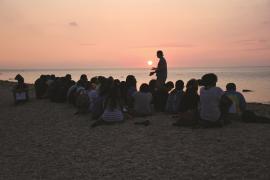Two of my professional mentors recently passed away after horrific battles with cancer. Their funerals gave me pause to reflect on the deeply profound impact they each had on who I am today, both personally and professionally. One of these mentors was responsible for inviting me into the camp profession and encouraged me to build my professional camp education and become an active American Camp Association (ACA) volunteer leader. He shared many insights that I wouldn’t have otherwise known and helped me recognize and understand my blind spots. My other late mentor helped me learn to power through my challenges and boldly take positive risks and persist incessantly. He was an exceptional visionary and project manager who inspired me to always think bigger and bolder.
Both mentors taught me important leadership lessons about cultivating a culture of collaborative problem-solving, being a facilitative leader, and leading from a position of equality. Mentors are key to helping emerging camp professionals determine who they want to become, how they must evolve to realize this aspiration, and how they can leverage their college and camp employment experiences to bring about these changes. As CEO of ACA, I’m eager to help facilitate more mentor-mentee connections throughout the camp profession, knowing that this will in turn stimulate greater professional retention and a stronger field of American camp.
Consider investing time in being a mentor to others in the camp profession. It is a great way to give back to our field and gain personal satisfaction from making a difference to the career development of an emerging professional. You’ll hear fresh perspectives from young innovators and increase your network. You’ll have more opportunities to reflect on your own professional path: what you have achieved and how you got there, as well as insights on how to continue to develop new skills and attributes to further your career.
Over the past year, I’ve committed to mentoring an emerging camp executive director who is creating innovative nonprofit camp programs for younger and older adults. We connect at least quarterly, and I take time to learn about her day-to-day challenges as well as her visionary goals. Wherever possible, I share my network with her and offer candid ideas and advice on a wide range of topics when asked. It’s exciting to see her surpassing her goals and beginning to think bigger and bolder. Mentoring her has been a great opportunity for me to learn as well. She has excellent insights on millennials and post-millennials that I really need and treasure.
If you are a standards visitor, consider mentoring a neighboring camp director who is interested in their camp becoming an ACA-Accredited Camp®. This summer brought a lot of media attention around camp staff screening, camper supervision, communicable disease challenges, camp security, child abuse prevention, and the value of ACA accreditation for parents. With state laws so inconsistent nationally, ACA accreditation is a parent’s best evidence of a camp’s commitment to camper and staff safety, health, and risk management. For example, with many states still not requiring mandatory employee and volunteer background checks and other foundational policies related to overnight camps, ACA accreditation is often heralded by the media as an essential camp search criterion for parents. Every camp should be American Camp Association accredited, and mentorship can help us strengthen the field.
It’s essential that we all invest in the future development of our camp profession. Mentoring an emerging camp professional helps them feel like they matter — and they do. They are the future of camp.

